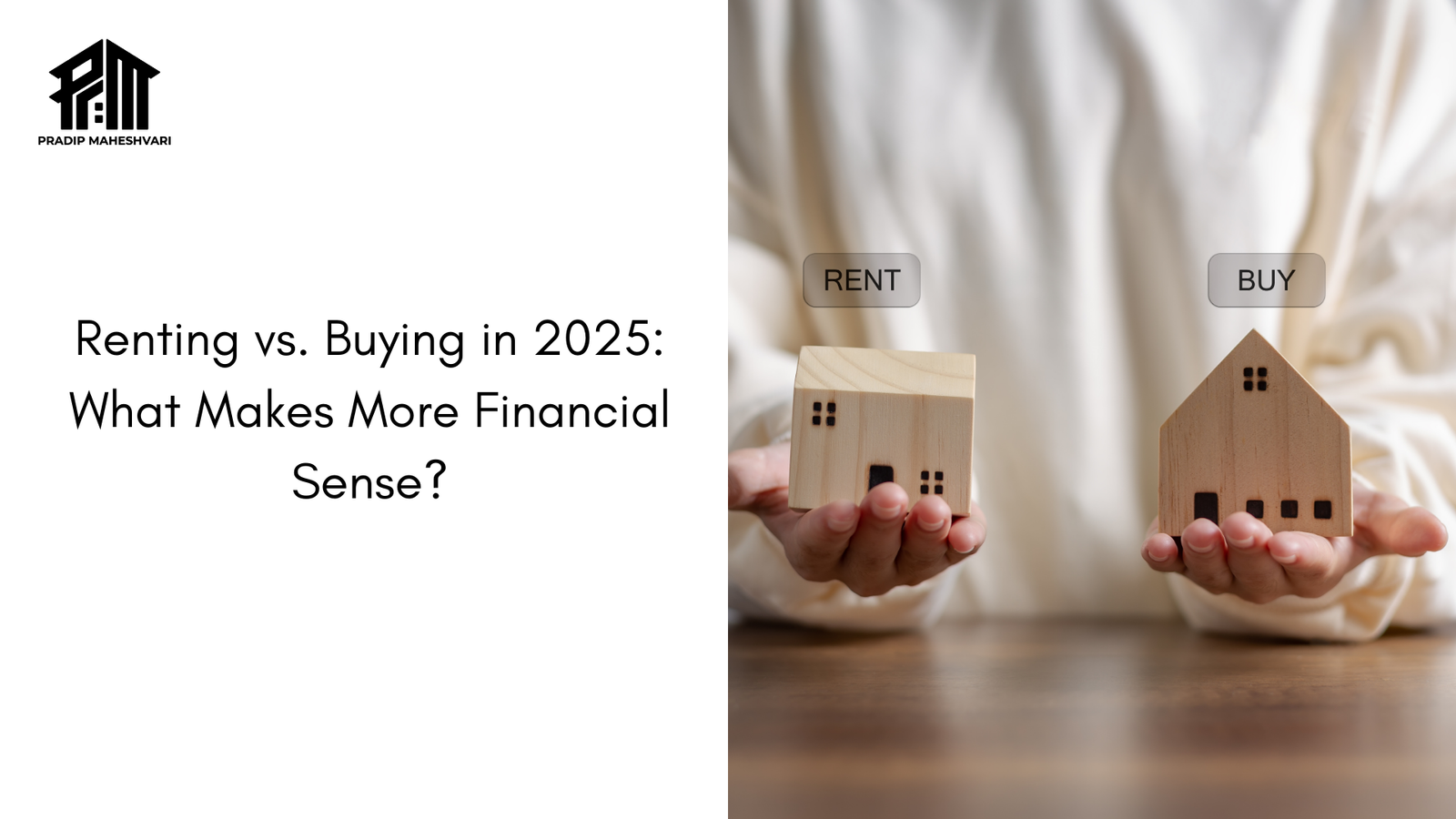Buying a home in Canada? Use this free checklist to know exactly what to inspect before making an offer. Avoid costly mistakes and protect your investment.
Continue readingWhat Type of Property Should You Buy in Your 30s? Condo vs. Freehold
Trying to decide between a condo or a freehold home in your 30s? Learn the pros, cons, and financial differences to choose the best property type for your lifestyle and future goals.
Continue reading5 Traps to Avoid When House Hunting with a Real Estate Agent
Learn the top 5 traps to avoid when buying a home with a real estate agent in Canada. Discover how to protect your budget, stay focused, and make confident property decisions.
Continue readingTop 7 Tips for Making a Winning Offer in a Competitive Housing Market
Learn 7 proven tips to make a winning offer in Canada’s housing market tp get pre-approved, reduce conditions, and outshine other buyers.
Continue readingHow Rising Property Taxes Are Affecting Home Affordability in Canada
Property taxes are going up across Canada, and it’s not just an abstract number on your tax bill. It’s directly affecting what homes people can afford, how much they can borrow, and whether they can keep up with ownership costs. When your monthly property tax bill increases, your mortgage approval amount can shrink, and your long-term affordability picture changes. This article breaks down what’s causing property tax increases, how they impact both buyers and homeowners, and what you can do about it.
What’s Causing Property Taxes to Rise Across Canada?
Property taxes are based on two things: your property’s assessed value and the local tax rate (also called the mill rate). Both are increasing at the same time, which results in much higher bills for homeowners.
Municipal Budget Increases
Cities like Toronto, Vancouver, and Calgary are raising property taxes to cover growing costs for services like infrastructure, transit, and emergency services. Without additional help from federal or provincial governments, municipalities rely on homeowners to fill the gap.
Higher Property Assessments
Housing prices have surged in recent years. Now, new assessments are catching up to those values. Even if your local tax rate stays the same, a higher assessment means a higher tax bill.
Changes in Provincial Funding
Some provinces have shifted responsibilities to municipalities without increasing financial support. This forces local governments to make up the shortfall by increasing property taxes.
Local Inflation and Service Costs
Rising wages, fuel costs, and material expenses are making it more expensive for cities to maintain basic services. These costs are passed on to homeowners through higher taxes.
Why It Matters for Homebuyers and Owners
Rising property taxes increase the cost of homeownership in both obvious and hidden ways. For buyers, it reduces how much they can borrow, since lenders include taxes in their affordability calculations. For homeowners, higher annual taxes make it harder to manage monthly budgets and long-term financial plans.
A $500–$1,000 increase in annual taxes can reduce your mortgage eligibility by thousands of dollars. That could change the type of home you can afford or require you to look in a different neighbourhood.
Smart Ways to Deal with Property Tax Increases
You can’t stop tax increases, but you can plan around them. These practical tips will help you manage the impact:
Appeal Your Property’s Assessed Value
If your home’s assessment seems too high, you can appeal it. Gather recent sales data for similar homes and submit a formal request through your provincial or municipal property assessment office.
Ask for Accurate Property Tax Estimates When Buying
Before buying a home, ask for the most recent tax bill. Also check if the property has been recently reassessed. A home that looks affordable on paper could carry a much higher tax cost than expected.
Research Municipal Tax History Before Choosing a Neighbourhood
Some cities and towns have a stable history of tax rates, while others increase aggressively year over year. Review property tax trends and compare them as part of your decision-making process.
Check Eligibility for Tax Relief or Rebate Programs
Some cities and provinces offer property tax relief programs for seniors, low-income households, and first-time buyers. Look up your local municipality’s website to see if you qualify.
Include Tax Growth in Your Housing Budget
Set aside an extra $50–$100 per month to prepare for tax increases. Building this buffer into your budget will help you stay stable when new bills arrive.
Conclusion
Rising property taxes are affecting affordability in a very real way. They’re driven by higher assessments, growing municipal budgets, and shifts in provincial funding. As a result, both buyers and homeowners need to adjust their planning.
Start by checking how your property is assessed, planning for tax increases in your budget, and asking for the full tax picture when considering a new home. If you need help factoring taxes into your mortgage strategy, reach out to Pradip Maheshvari for expert, personalized guidance on protecting your affordability.
Why Your Credit Score Dropped Before Mortgage Approval (And How to Fix It)
Learn why your credit score dropped before mortgage approval and fast ways to fix it and avoid delays in closing your home loan.
Continue readingTop Tips to Save for a Down Payment Faster
Learn smart ways to save for a down payment, like budget tips, RRSP strategies, side income ideas, and tools that make saving faster and easier.
Continue readingBest Places to Buy Property in Ontario Right Now (And Why)
Ontario’s real estate market in 2025 is shifting. While big-city prices remain high, new pockets of opportunity have emerged, offering better value, stronger appreciation potential, and lifestyle perks for both investors and end users. Whether you’re a first-time buyer, looking for a family upgrade, or planning a long-term investment, choosing the right location can make or break your outcome.
Below is a breakdown of the top places in Ontario to buy property right now, and why each market stands out.
1. Hamilton – The Best of Urban and Affordability
Hamilton continues to attract buyers priced out of Toronto. With a solid job market, universities, and major infrastructure upgrades (like LRT construction and GO transit expansion), Hamilton offers an urban lifestyle at a more accessible price point.
Why it’s hot:
- Still cheaper than Toronto and Mississauga
- High rental demand from students and professionals
- Ongoing city revitalization, especially downtown
For buyers looking for duplexes, starter homes, or investment properties, Hamilton hits the sweet spot between price and potential.
2. London – A Fast-Growing Hub with Affordable Homes
London, Ontario, is no longer just a university town. With a booming healthcare sector, new tech employers, and more people working remotely, the demand for housing in London is rising steadily.
What makes it attractive:
- Average home prices are significantly below the provincial average
- Growing population and infrastructure investment
- Strong rental market for both families and students
For investors and end-users alike, London offers stability, appreciation, and relatively low entry costs.
3. Ottawa – Stable, Government-Backed Growth
As Canada’s capital, Ottawa benefits from a strong public sector employment base. This provides insulation from economic volatility, making it one of the most stable real estate markets in the country.
Key strengths:
- Reliable job market and steady population growth
- Diverse mix of property types from condos to family homes
- Growing tech industry alongside federal employment
If you’re seeking long-term appreciation with low risk, Ottawa deserves a serious look.
4. Windsor – Underrated and Poised for Upside
Windsor has quietly become one of the best value markets in Ontario. It’s benefiting from major automotive investments and a surge in cross-border interest due to its proximity to Detroit.
Why Windsor is a sleeper pick:
- One of Ontario’s most affordable cities
- New battery and EV manufacturing jobs boosting local economy
- Massive infrastructure projects, including bridge expansion
Windsor is ideal for those prioritizing cash flow or entry-level investment properties.
5. Kitchener-Waterloo – The Silicon Valley of the North
Kitchener-Waterloo’s tech industry, including giants like Google and Shopify, continues to drive demand for homes. Add in universities and a young professional population, and you get a fast-moving, high-demand real estate market.
What stands out:
- Strong economic fundamentals
- Excellent appreciation over the last five years
- Desirable lifestyle and access to Toronto via GO train
It’s competitive, but the long-term upside remains strong, especially for those buying early in newer developments.
6. Barrie – A Balanced Market with GTA Proximity
For those priced out of the GTA, Barrie offers a livable alternative. It has good schools, a strong sense of community, and lakefront living, all within commuting distance of Toronto.
Advantages of buying in Barrie:
- Steady property appreciation
- Commuter rail access to the GTA
- Lower property taxes and less congestion
As more people seek work-life balance and space, Barrie is absorbing overflow demand from Toronto and York Region.
7. Kingston – The Quiet Winner for Long-Term Value
Kingston offers a mix of education, healthcare, tourism, and waterfront charm. It remains under the radar, which means prices are still reasonable.
Why it’s worth considering:
- Queen’s University and stable student housing demand
- Strong public services sector (military, healthcare)
- Growing reputation as a retirement destination
If you’re looking for a low-maintenance investment or long-term living, Kingston is a strategic, lower-risk option.
Choosing Based on Your Goals
Not every city fits every buyer. Here’s how to think about it:
- For investors: Look at Windsor, Hamilton, and London for best price-to-rent ratios
- For families: Ottawa and Barrie offer stability and strong schools
- For professionals: Kitchener-Waterloo and Hamilton are rich in career options and lifestyle
- For retirees or slow-growth seekers: Kingston provides peace of mind and consistent returns
Conclusion
Ontario’s real estate market is more diverse than ever. While Toronto will always be the flagship city, smart buyers are looking at fast-growing secondary markets where job growth, affordability, and livability are aligning. Whether you’re after cash flow, appreciation, or a place to call home, the cities above represent the best places to buy property in Ontario right now.Pradip Maheshvari helps homebuyers and investors navigate these opportunities with expert mortgage guidance tailored to their financial goals. Let’s talk about where and how you can buy with confidence.
Renting vs. Buying in 2025: What Makes More Financial Sense?
Should you rent or buy a home in 2025? Explore the financial pros and cons of each option in today’s market. Get expert insights and a cost comparison to make the right move.
Continue readingWhat the Bank Won’t Tell You About Pre-Approval Letters
A pre-approval isn’t a guarantee. Learn what banks leave out and how to protect yourself in the mortgage process.
Continue reading








